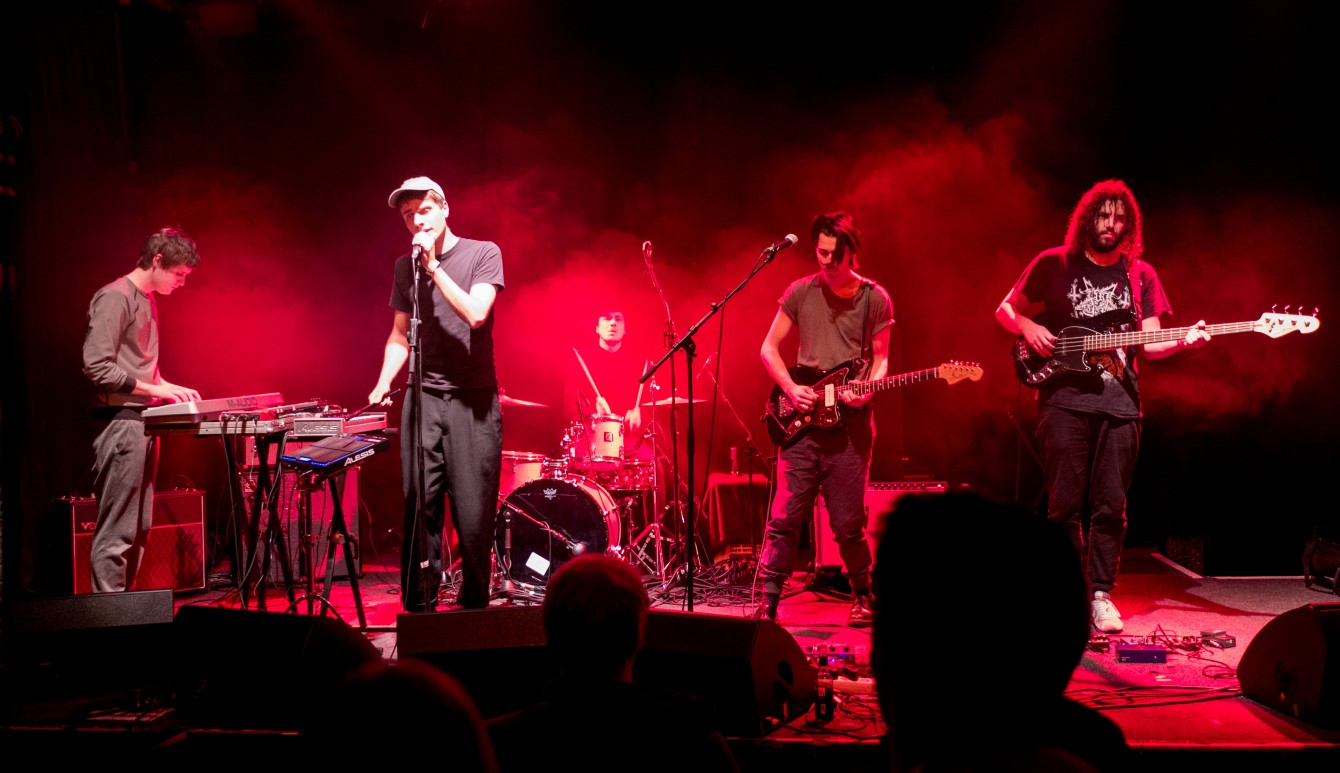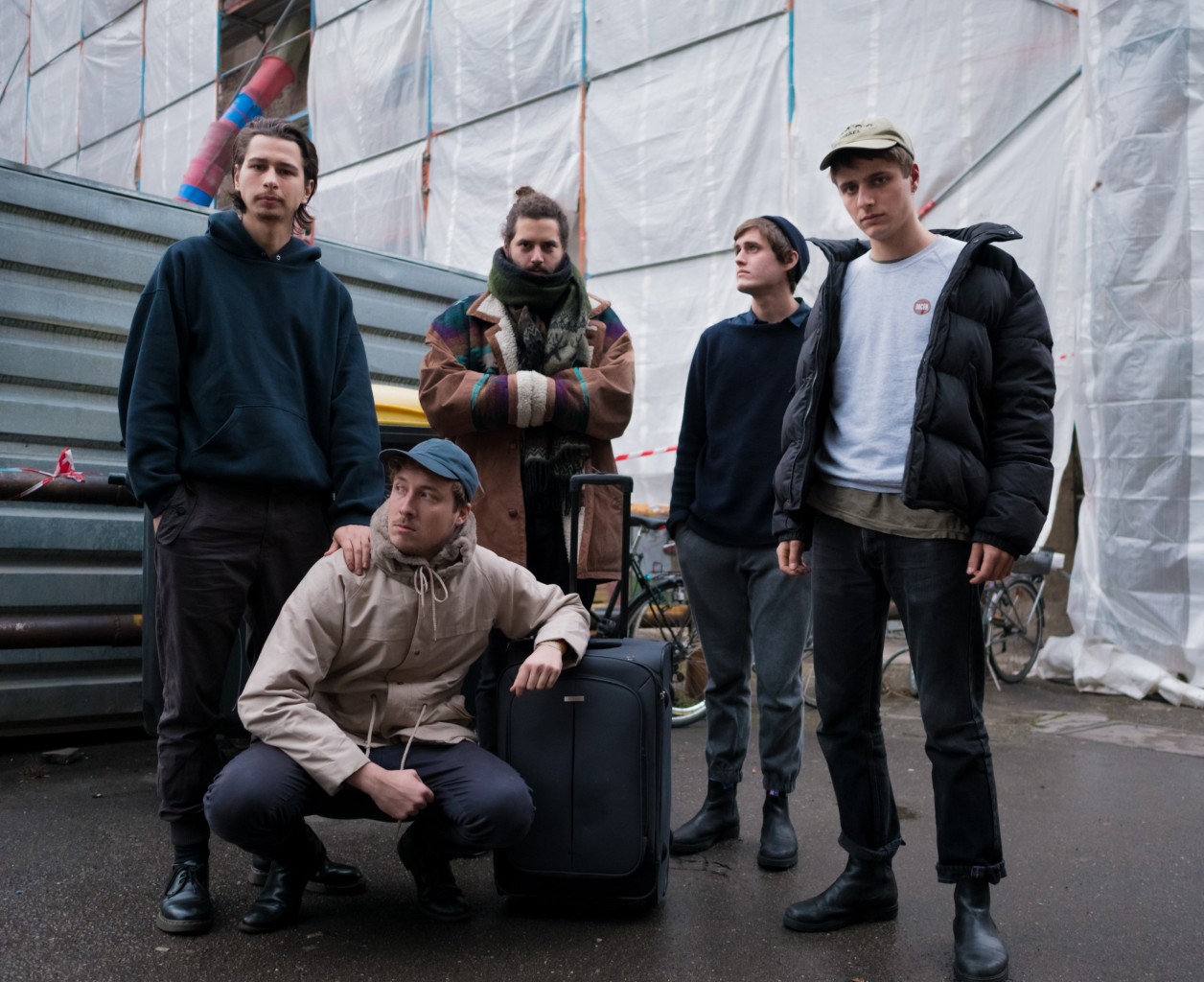
Photo by Markus Alexander Voigt
From the very start, DER RINGER (‘The wrestler’) have been cultivating their very own attitude. Children of Germany’s capitol of ‘discourse-pop’ Hamburg, they’ve played with the expectations of being a rock band in the 21st century, increasingly venturing out into uncharted territory. What brought them to this point was not clinging to a well-defined aesthetic but staying soft and flexible, adapting and changing in order to grow. Evolving from an observant melancholia, their lyrics have grown to be metaphorical, saying more in less words — not judging, but accepting and commenting on what it means to live in this day and age.
It hasn’t always been this way. In their beginnings, DER RINGER were still very much influenced by math-pop and post-punk. Their first EP Das Königreich liegt unter uns (‘the kingdom lies below us’) (2013) is a testament of that era, dense with musical ideas and inventive lines, but still in search for a distinctive sound. Energetic stand-alone single Das Goldene Ticket (‘the golden ticket’) (2014) emphasised their more punk leanings, but it wasn’t until their second EP Glücklich (‘Happy’) (2016) that a departure from the German post-punk scene began to become apparent.
Looking for an exciting sound
The release of Das Goldene Ticket heralded the end of an era as a second chapter slowly set in and DER RINGER underwent three crucial changes. In terms of internal structure, Benito Pflüger took over the duty of playing drums whereas Jannik Schneider stepped to the front and matured to become the band’s lead singer. Starting to live up to their new roles, the reorganised quintet grew in confidence and continued to write new songs following a clearly defined goal: to not sound like any other German indie band. Although their many influences can’t all be traced in the music, a broad taste as well as a distinguished love for sound (patterns) helped to shape the unique handwriting of Glücklich and Soft Kill (2017), DER RINGER’s debut album released on Staatsakt, January 27. Benito describes what the band finds inspiration in: ‘The clubs in Hamburg we go to have never been our main influence. It’s rather that we find inspiration in anything we find anywhere. It’s what the internet allows for’. Hence, they’re familiar with trap just as they’re fascinated by K-pop. Their playlist includes diverse artists such as YOUNG THUG and DAGOBERT. Indeed, it’s not the genre that matters but the composition the band show interest for. Jakob adds:
We’re always looking for an exciting sound. For instance, we’ve been listening a lot to HEALTH who combine noise elements with pop elements and too present themselves in an interesting way. Another great example are DEATH GRIPS who merge noise and punk elements with rap.
When DER RINGER realised that their sound was gladly evolving, the band took another step forward and furthermore emancipated themselves from the German indie scene by showing their willingness to temporarily relocate. After several writing sessions in Hamburg and Marburg and reworking their demos for more than a year, the band decided to go down south in 2015 and established themselves in Rome in order to record the songs for a new EP and, ultimately, their long-awaited debut album. ‘Producing demos via Ableton makes it easier for us to arrange the songs. It is only afterwards that we start to think about how we are going to play them live. So we moved in with our producer Filippo Cimatti and talked a lot about the recording. During that time, Filippo sort of became our sixth member and took an active role in shaping the sound of the record’, Jakob and Jannik tell. DER RINGER’s decision to collaborate with an Italian producer who is neither familiar with the German indie scene nor the German language led critical voices to question the aptness of their choice and suggest picking a renowned German name instead. The band, however, confidently started to work with the Italian who successfully helped the band design a unique sound, existing of at least two flamboyant characteristics, namely the fluid interaction between voice and sound and the usage of auto tune. As opposed to German ‘discourse-rock’ bands such as TOCOTRONIC or ISOLATION BERLIN (who we introduced to you last year), DER RINGER have a different understanding of their art and treat lyrics and music equal, not focussing on allegedly complex lyrics too much. Jakob explains:
We don’t want our music to primarily function as a vehicle for difficult lyrics. Au contraire, we would like to let the music itself have a greater impact and evoke as well as carry emotions. In our songs, the vocals rather work as an instrument.

Photo by Christian Isenbügel
Considering how DER RINGER understand the nature of their sound, the band’s decision to turn towards auto tune is reasonable. In a reworked version of Apparat on Soft Kill, for instance, auto tuned vocals merge with warm synth melodies, marking an effective fusion that heralds the emotional peak of a song that observes interpersonal relationships in the digital era. Der RINGER’s modus operandi might be ‘music first’, still, their textual message rarely fails to come across. The band is well aware of a given circumstance that the German audience lacks acceptance for auto tune when it is used in German music, though. Jannik reflects:
‘The German audience tends to be somewhat conservative. For instance, auto tune — which has been heavily used internationally for a long time now — feels strange to people when it’s used in German music. And so there are various musical elements around internationally that haven’t found their way into German music, yet, which is strange but at the same time good for us, I suppose.’
‘Being authentic is boring’
It will be no surprise to anyone that DER RINGER make extensive use of the possibilities of social media. Not only have they been experimenting with different means of presentation on their own website , where visitors are currently greeted by a chatbot playing excerpts from the new record — there is also a particular tone to their posts on Facebook, Instagram or Snapchat that sets them apart from fellow musicians. ‘It’s a very natural thing for us‘, confesses Benito, and Jannik adds:
I think on Facebook you are in a public space where some kind of staging makes perfect sense — everyone does that, not only bands. Essentially, on Facebook you can purport things and present yourself in any way you want.

Photo by Christian Isenbügel
Unsurprisingly, the band are wary of the current trend that calls for a return to authenticity — being ‘yourself’ and appearing ‘normal’ is very much á la mode. Once an underground response to the artifice that was going on in the charts, authenticity has become the mainstream. ‘I think indie is to blame for this. Back in the 2000s everyone considered normal dudes with guitars to be cool. There’s a whole bunch of artists now whose self-potrayal consists of embodying authenticity but we would never class ourselves among them’, explain Jannik and Benito. They don’t see anything bad in inventing things or playing to the gallery; the group would like to turn around the current trend by offering something more innnovative: ‘Everything that somebody does on Facebook is staging — and if we do that, we would at least like to do it in an interesting way. Otherwise, we would bore ourselves’ says Benito and recalls a quote by Travis Scott:
‘Being real is not being yourself, but pretending to be a somebody and being good at it. When you’re fake, you’re doing it wrong’ — I think that’s our understanding of it. Nobody is themselves, not even Leonard Cohen when he is on stage singing about his deepest fears. It is always a performance.
Although years ago, DER RINGER used to wear masks onstage, Jannik points out that it was never about hiding. ‘Those masks were very distracting while playing drums and singing… the ones we’re wearing now are much more comfy. But it goes much deeper than concealing ourselves — it is about a different kind of masquerade.‘ It’s the same kind of mask that appears on the artwork for Soft Kill — an opaque, shimmering blue covering his face — that serves as a focal point for the narrative of the album. ‘It is about how you can present yourself, play with different roles, put on masks and take them off again’, says Jakob. “’Soma’, for example, deals with the need to stay soft in order to not get stuck in your shell, but instead be moldable and open for change.’ And Jannik adds:
There’s no need to recreate music that has already been existing for over 30 years when there’s room for development.
With the band’s commitment to ongoing change, there is no need to be afraid of stagnation. Instead, one can be hopeful that their idea of having a profound attitude and progressive sound at least gradually rubs off on the German music scene whose mainstream in particular tends to be rather conservative, visibly indicating the tendency to clinging to established structures. In the end, a well-known 1986-quotation by the ‘Man Machine’, i.e. KRAFTWERK, seems to be a fitting slogan for DER RINGER‘s approach: ‘Es wird immer weitergehen/ Musik als Träger von Ideen‘ (Kraftwerk, Techno Pop, 1986).
—



